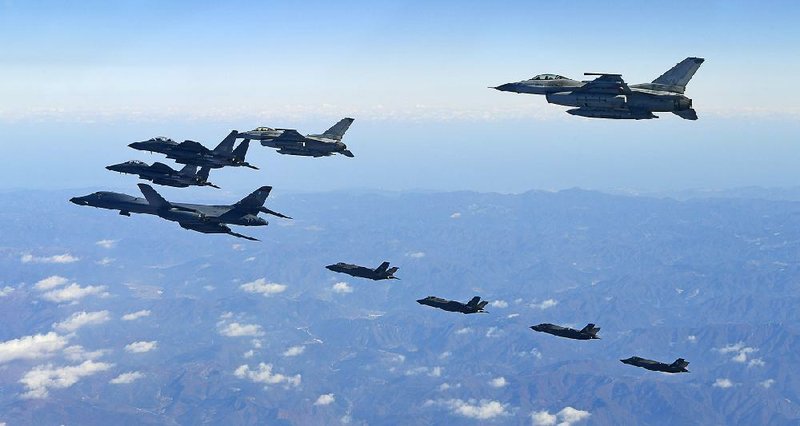GUANGZHOU, China -- The U.S. would be ready to talk with North Korea if it renounced further nuclear or missile tests and followed through on the pledge, U.S. Ambassador to China Terry Branstad said.
As South Korea and the U.S. continued a joint military exercise, meanwhile, North Korea said Wednesday that a war on the Korean Peninsula has become inevitable.
Branstad on Wednesday told Bloomberg Television that talks could start "if they announce that they're not going to be doing any more nuclear tests and they're not going to be launching any more missiles. If they announce that and do that, I think there's an opportunity for us to get back to the bargaining table."
Branstad, speaking on the sidelines of the Fortune Global Forum in Guangzhou, also said that sanctions against North Korea were "starting to have an impact."
Calling Kim Jong Un's push for nuclear weapons "the biggest threat to humankind right now," the former Iowa governor repeated the Trump administration's call for China to cut off oil sales to Kim's regime.
"We believe we need to go further," Branstad said. "We think oil and also these North Korean workers working in China and other countries, that needs to stop."
President Donald Trump has sought to pressure China to rein in its ally and neighbor, which last week tested a new type of intercontinental ballistic missile. Kim said the test showed that North Korea's nuclear program was complete because it could deliver an atomic warhead anywhere in the U.S.
While Kim hasn't yet proven he has the technology to put a warhead on an ICBM and deliver it to a target, the test has put new pressure on the U.S. and its allies to find a solution.
The United Nations' top official for political affairs is in Pyongyang this week to discuss the nuclear issue, and countries from Canada to Germany are seeking to help facilitate talks. Branstad told the economic forum later Wednesday that Canadian Prime Minister Justin Trudeau would meet with U.S. Secretary of State Rex Tillerson to discuss North Korea on Dec. 19.
Meanwhile, the saber-rattling has continued on both sides, with the U.S. sending a B-1B bomber to join aerial drills with South Korea. North Korea had previously threatened to retaliate against the exercise with the "highest-level hard-line countermeasure in history."
The five-day drills that began Monday involve more than 200 aircraft, including six U.S. F-22 and 18 F-35 stealth fighters.
In comments attributed to an unnamed Foreign Ministry spokesman, North Korea also claimed that high-ranked U.S. officials, including CIA Director Mike Pompeo, have further confirmed American intent for war with a series of "bellicose remarks."
Pompeo said Saturday that U.S. intelligence agencies believe Kim doesn't have a good idea about how tenuous his situation is domestically and internationally. The North's spokesman said Pompeo provoked the country by "impudently criticizing our supreme leadership, which is the heart of our people."
"The large-scale nuclear war exercises conducted by the U.S. in succession are creating touch-and-go situation on the Korean Peninsula and series of violent war remarks coming from the U.S. high-level politicians amid such circumstances have made an outbreak of war on the Korean Peninsula an established fact. The remaining question now is: When will the war break out," the spokesman said.
A provincial state newspaper on China's border with North Korea meanwhile spooked some on Wednesday by dedicating an entire page to advice for residents on how they might survive a nuclear war.
The advisory, by the official Jilin Daily, was picked up by many online news services and circulated widely on Chinese social media, forcing the paper and other state media outlets to hurriedly issue statements trying to calm people down.
It also marked one of the first times that official China has talked seriously about the threat of a nuclear war.
Information for this article was contributed by Peter Martin, Tom Mackenzie, Dexter Roberts and Ken Wills of Bloomberg News; by Simon Denyer, Luna Lin and Liu Yang of The Washington Post; and by Kim Tong-Hyung of The Associated Press.
A Section on 12/07/2017

